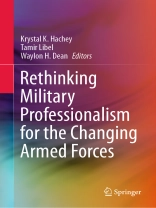This book will make a first contribution to identify the gaps in current practices and provide alternative mechanisms to conceptualize professionalism that is reflective of changing requirements, culture, and demographics of the contemporary military force.The military profession promotes the development, sustainment, and embodiment of ethos, which guides conduct across operational contexts, from times of national and international crises and security challenges (e.g., war, natural disasters, and peace support operations). It is imperative for military leaders to understand how ethos and doctrine shape professional frameworks, which guide the conduct of military members.
Tabella dei contenuti
1. Rethinking military professionalism.- 2. The Rise and Fall of the Study of the Military Profession: From the Sociology of the Military Profession to the Sociology of Security Expertise.- 3. The Changing Military Profession in Bulgaria.- 4. Perspectives on Military Professionalism from Canadian Armed Forces Members.- 5. New Times for Military Professionalism: Rethinking Core Competencies and Dynamic Capabilities. 6. Irish Defence Forces implementing United Nations Security Council Resolution 1325.- 7. Power Resources Among Female Military Personnel.- 8. Military Professionalism and the British Army.- 9. Civilian Military Experts: Findings from the 2017 Survey of American Military Experts.- 10. Disrupting Social Constructions in the Profession of Arms.- 11. A New Spirit of Militarism? Person–Organization Fit and Economies of Worth Among New Military Cadets.- 12. Equity, Diversity and Inclusion: Revising the Concept of Military Professionalism in the Canadian Armed Forces.- The Impact of Artificial Intelligence on the Military Profession.- Rethinking Military Professionalism for the Twenty-First Century.- 15. Afterword: Toward a Culture and Gender-Inclusive Model of Military Professionalism: Theoretical Achievements and Practical Implications.
Circa l’autore
Dr. Krystal Hachey, a Defence Scientist, leads the Leadership, Culture, and Ethics Team in Director General Military Personnel Research and Analysis within Canada’s Department of National Defence. She holds a MEd in educational psychology from the University of Saskatchewan and a Ph D in measurement and evaluation from the University of Ottawa. Dr. Hachey conducts scientific research examining the relationships between culture, ethos, professionalism, performance, and leadership effectiveness in the Canadian Armed Forces. Her work has been published in peer-reviewed journals such as Res Militaris, Military Behavioural Health, and Journal of Military, Family, and Veteran Health and has chapters published in military books on physical fitness and performance measurement through the Canadian Defence Academy.
Dr. Tamir Libel has a Ph D in political science (2009) from Bar Ilan University, Israel. He is a former Beatriu de Pinós research fellow at the Barcelona Institute of International Studies (IBEI). Previously, he was a Marie Curie Postdoctoral Fellow in the School of Politics and International Relations (SPIRE) at UCD, and a visiting scholar at both the Department of Political Science at the University of Trier and the Department of History at the University of Marburg in Germany. His work combines theoretical approaches of sociology of knowledge and data science methods to study security and military affairs. His work was published in peer-reviewed journals such as Journal of Strategic Studies, RUSI Journal, Defense & Security Analysis, Journal of Intelligence History and Defence Studies and his book European Military Culture and Security Governance: Soldiers, Scholars and National Defence Universities was published by Routledge in 2016.












